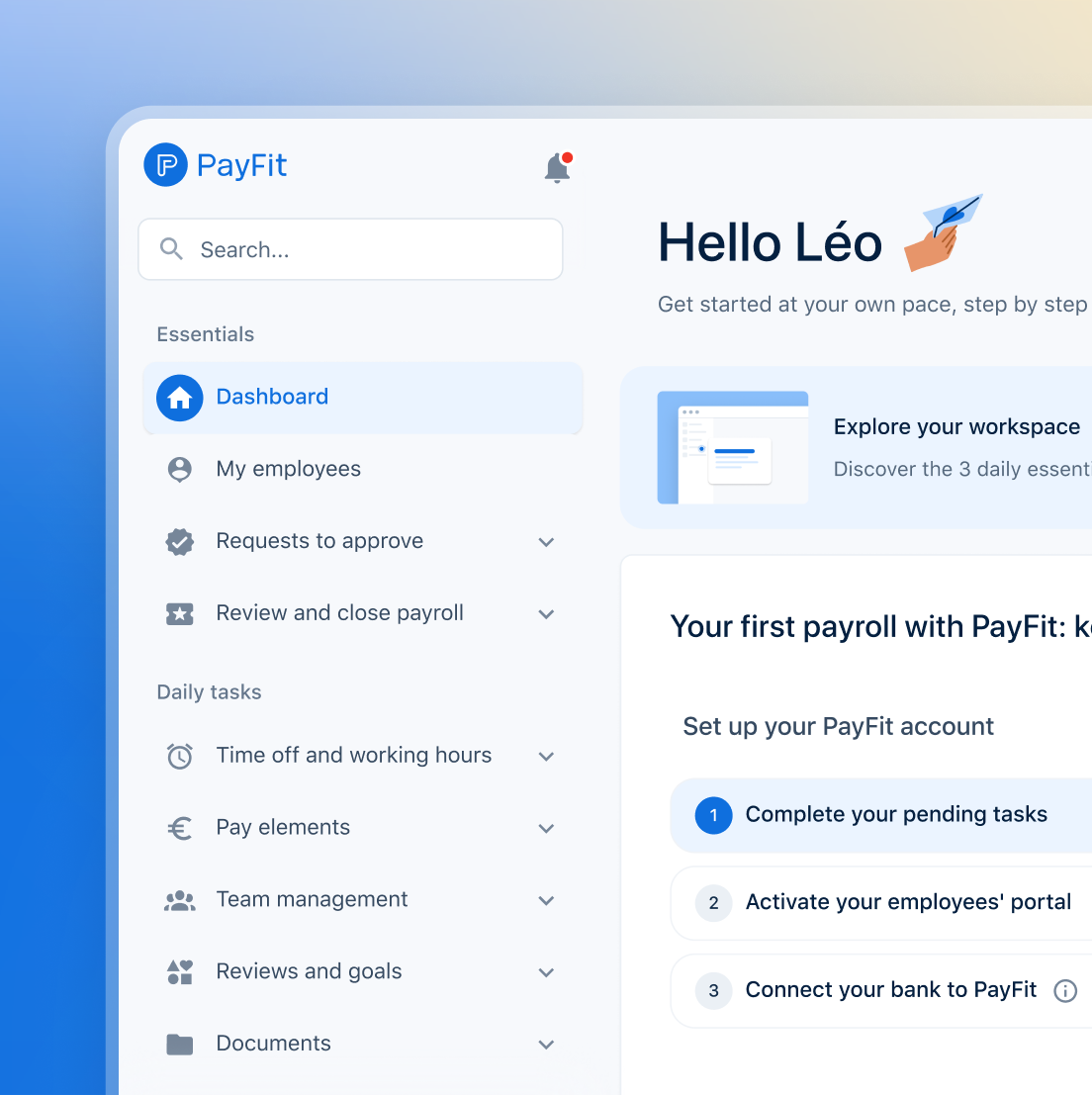✨ Health insurance, now in PayFit - learn more
💷 All the rates & thresholds you need to know for 25/26...right here
✨ The Payroll Journey: Start, Scale & Succeed Globally - learn more
✨ Health insurance, now in PayFit - learn more
💷 All the rates & thresholds you need to know for 25/26...right here
✨ The Payroll Journey: Start, Scale & Succeed Globally - learn more

Choosing a payroll provider is always a big decision, and not one that any finance team or HR department should take lightly. There is bound to be a certain amount of trepidation; after all, it’s a big thing to take the leap to something new.
Many businesses will see the end of the tax year as the ideal time to make the switch and start their payroll on a new footing. That being said, you can change payroll providers any time of the year really without too much fuss - it’s about finding a time that works for your business.
Before deciding anything, you'll likely sit down with your key stakeholders to do extensive market research and analyse the options available. To help your search (‘cause we’re nice like that!) we've written this short piece about how to choose a payroll provider, highlighting four factors you should consider when making the leap.
We've written about the payroll outsourcing vs in-house debate before. Each option has its perks, and you must identify what suits you and your business's needs best.
To help make the decision easier, think about the pain points you're currently facing. For example, if visibility and control over the payroll process is something you lack and you want to be allowed to make changes yourself, in-house payroll is likely the best way forward.
With in-house payroll, you become responsible for the whole payroll process—e.g., paying employees on time, calculations, submissions to HMRC, and much more.
But for many companies, hiring a dedicated payroll professional may not be viable. Without this expertise, or the time required to complete payroll in-house, companies often turn to outsourcing.
However, this comes with a host of challenges. That's because many companies tend to use accountants or financial advisors rather than qualified payroll professionals to run their payroll. And many of these professionals still rely on outdated legacy systems that aren't set up with the modern business world in mind.
Even worse, choosing an outsourcing provider that fails to keep up to date with the latest payroll legislation can have serious consequences. Errors can occur—e.g. employees may be under or overpaid, and, in a worst-case scenario, non-compliance may arise, which could lead to penalties from HMRC (ouch!).
It's important to remember that in the in-house versus outsourcing debate, the accountability for ensuring accurate and compliant payroll always lies with the employer, no matter who does the day-to-day input.
Stuck between outsourcing and in-house? At PayFit, we actually offer the best of both worlds: in-house payroll software that automates calculations supported by a dedicated customer support team (including professionally qualified payroll specialists).
This means that even those with limited prior payroll experience can confidently use our platform (a win-win all-around).
There are very few situations in life where we don't think about the value of something we've paid for.
The current economic climate, in particular, has highlighted the importance of setting and keeping a budget. For businesses, there is more pressure than ever before to ensure that spending represents value for money.
Most will have a company-wide budget split and then filtered down to individual departments. And this may sound a little surprising, but not all companies have a budget when it comes to payroll.
Often, payroll is combined with other business functions—e.g. payroll with accountancy or payroll and HR. In such situations, the cost of its administration becomes diluted and unclear.
The price of running payroll can vary considerably depending on who you choose to work with.
Some payroll bureaus can be very inexpensive, but the service provided can often reflect this. Equally, using accountants can be expensive and often without justification, especially when there's specialised payroll software that can provide a happy medium.
The coronavirus pandemic demonstrated how complex payroll can be and how companies must react to changes to keep their employees paid on time and correctly.
Furlough calculations, not to mention changes to Statutory Sick Pay (SSP), left even the most experienced payrollers scratching their heads.
So, when weighing up payroll providers, you must identify areas where you will need support.
For example, if calculations have proved a stumbling block before, or if HMRC submissions take up a lot of your time, it's a good idea to find a provider that can help support you with those specific issues.
We understand how challenging payroll can be, and we know that payroll administration can be a stressful process.
One of our fundamental goals is to remove any anxiety and support you whenever you need it.
Thanks to our dedicated account managers, who are also qualified CIPP payroll professionals, and who are always up to speed on the latest legislation changes, we're always available to answer even the most complex payroll problems.
Some companies have what they call "stand-alone" payroll departments; however, the reality is that payroll is never a stand-alone process.
Without direct links to HR and finance and third parties such as HMRC or pension providers, running payroll would be a difficult, if not impossible, task.
Companies will often use different software for different departments; however, this often comes with the need for manual data input. This is not only time-consuming and laborious, but it can also be open to human error.
Payroll integrations allow one software to talk to another while removing the need for manual input or data manipulation, so you don't waste time entering numbers twice.
For smaller companies, after an all-in-one solution, our software has its own payroll, HRIS and expenses platform. That means that integration starts within the PayFit platform itself.
Nevertheless, we know from our current customers that their processes and company setup mean they often want to link up different software, particularly for finance and HR duties.
At PayFit, we want your payroll processes to be as pain-free and efficient as possible. As such, we offer compatibility with the most popular HR software in the market, such as Hibob, BambooHR or Personio.
You can also benefit from our current integrations and support, such as:
HMRC - We process tax codes and student loan changes directly from your HMRC account to the PayFit app. We will also process your Real Time Information (RTI) reports on your behalf.
Accounting software - We have journal templates for many of the most popular accounting software (Xero, Sage, Quickbooks and Netsuite). These can be exported from the PayFit app and imported directly to your accounting software.
Pensions - For most automatic enrolment schemes, we will submit your pension report on your behalf.
If you're unhappy with your current payroll processes and feel like a change is needed, why not get in touch with us today? One of our product experts would be more than happy to run through the product and explain how we can simplify your company's payroll.


Compare the best payroll software for UK businesses in 2026. Discover solutions to automate compliance, support growth, & manage employees effectively.

Learn how to run payroll in the UK from how to register for PAYE, calculate tax and NI, send RTI submissions on time, to avoiding HMRC penalties.

Cloud-based payroll software helps UK businesses improve accuracy, reduce errors and maintain HMRC compliance by centralising payroll data and calculations.

We cover the principles of UK payroll accounting, as well as National Insurance rates, 2026/27 tax year compliance & how to streamline your financial reporting.

Essential guide for UK managers on payroll in human resource management, covering National Insurance changes, 2026 regulations, and compliance.

Understand exactly what is net pay, how to calculate it, and the latest UK tax and National Insurance changes for affecting your payroll.

See what's new in PayFit
New features to save you time and give you back control. Watch now to see what's possible